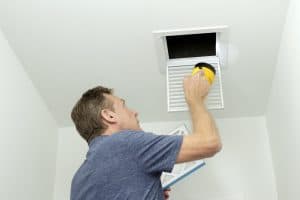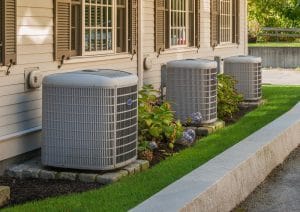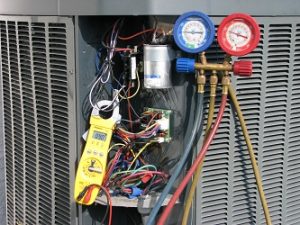AC Repair Vs AC Replacement – How Do You Know When It’s Time?
While an AC system has a long lifespan – a maximum of 20 years, it won’t perform efficiently if it is not properly cared for. It can also last longer if the air ducts and filters are regularly cleaned. For many, as long as the air conditioning system is working well, there is nothing wrong with it. Often, homeowners only pay attention when it starts getting hot outside and the air conditioning is blowing out hot, humid air.
You must not wait for your air conditioning unit to break down before you start taking care of it. You have to give it the attention it needs, just like all the other appliances in your home.
Taking care of your AC won’t be easy, especially if you do not have technical knowledge about HVAC systems. There are several things to consider, the foremost of which is a question that has confused a lot of homeowners for years: how do you know when you need an AC repairRepair is the act of fixing or restoring damaged property, m... More or a replacement?
What is AC Repair?

Air conditioning repairRepair is the act of fixing or restoring damaged property, m... More is a kind of service that takes care of issues like unusual noises and water leaks. It helps ensure that your AC does not have problems and is in good working condition.
When you ask a technician to repairRepair is the act of fixing or restoring damaged property, m... More your air conditioning, the first thing he will do is check for pipe or tube leaks. All the dirt and debris stuck in your unit will affect its performance, so they have to be removed as well by cleaning the air filter. Regular AC maintenanceMaintenance is the routine care, inspection, and repair of a... More checks will help pinpoint the problem areas of your unit. Consider professional air duct cleaning services.
A complete AC tune up or repairRepair is the act of fixing or restoring damaged property, m... More is all about doing all the work necessary to ensure that the unit is working as expected and even as if it were new.
What is AC Replacement?
On the other hand, AC replacement is when the technician updates a part of the unit or the entire system. There are times when you need to change just a part of your AC system, but it is more practical to replace the whole unit. It may require you to shell out more money, but it will prove to be a good investment in the long run.
AC replacements typically take only a day to complete, but there are instances that the process may take longer. This is why you need to have your system checked first before deciding to have it replaced.
When is AC Repair Needed?
 You have to consider several factors if you want to be sure that a repairRepair is the act of fixing or restoring damaged property, m... More or tune-up is what your AC unit needs.
You have to consider several factors if you want to be sure that a repairRepair is the act of fixing or restoring damaged property, m... More or tune-up is what your AC unit needs.
You’ve had your AC for less than ten years
Yes, age is a factor in ensuring the efficiency of an air conditioning system. As long as your AC has been serving you for less than ten years, it is considered young and can still be repaired. If the repairRepair is the act of fixing or restoring damaged property, m... More work is really good, your unit may look, feel, and work like new.
Repairs are more affordable than replacements
Air conditioning repair is generally more affordable than replacements. So it is ideal if your budget is just enough. If the issues are more critical than usual, the repairRepair is the act of fixing or restoring damaged property, m... More may cost a little more.
If your AC seldom breaks down
Repairs are recommended for air conditioning units that seldom have issues or if the problems are few and far between.
If the problems are common and minor ones
Minor air conditioning issues such as electrical failure, when the condenser unit is clogged, or when the unit is not blowing cold air do not merit a unit replacement and can all be repaired by an HVAC technician.
If the cooling capacity of your AC matches your room or office size
If your air conditioning unit matches the size of your room or office, it can provide maximum cooling capacity. If it does not blow cold air, call your HVAC technician and have it cleaned and repaired.
If your air conditioning unit has a high SEER rating
Seasonal Energy Efficiency Ratio or SEER measures your air conditioning unit’s cooling or performance efficiency, particularly in the summertime. The higher an AC’s SEER rating is, the more efficient it is. It can also help you save on your energy bill.
A good SEER rating would be 16, but higher ratings – such as SEER 18 and SEER 20, are way better.
With a high SEER rating, your AC is guaranteed to function at maximum capacity and efficiency. Thus, you have no reason to replace it.
When Should You Replace Your AC?

Your AC has been with you for ten years or more
The usual lifespan of an AC is 10 to 15 years. So, if your system is ten years old or more, it will not be as efficient as it used to be. Thus, you have to have it replaced. Among other things, a new AC will help you save on your energy bills.
Extensive damage on critical components
There are common and simple AC issues, and then there are extensive problems. If any of the unit’s critical components – the blower motor, compressor, and condenser coil, have serious damage, you’ll have to consider getting your AC replaced.
If you’re spending a lot of money on repairs
If you’re spending 50% of or more than the value of a new air conditioning unit, you need to have your AC replaced. It’s the most practical thing to do.
You call the technician for repairs more often than the usual
If you’ve been calling an HVAC technician to have your AC repaired more often than you should, it’s a sign that the repairs aren’t enough. In the long run, these constant repairs will cost you more, and you don’t even have a guarantee that the issues will be solved. So, the best thing to do is have your AC replaced.
Your AC has a low SEER rating
A low SEER rating means your unit is not as efficient and functional as you want it to be. Old AC models are usually the ones with low SEER ratings, so it’s best to have your unit replaced if it falls in such a category. Additionally, if you don’t change your AC, you’ll end up spending a lot on energy bills.
If the size of your AC is too small or too big for your room or office
The size of your AC should be in proportion with the size of your room or office. If it is too small or too big, it will not be energy-efficient and significantly affect the efficiency and lifespan of your unit.
Despite repairs, you’re AC still does not cool the room
An air conditioning unit that does not blow cold air despite constant repairs has to be replaced. Not doing so will not only be inconvenient, but it will also be costly.
If your AC uses Freon
Refrigerant chemical Freon has been proven to damage the ozone layer, which is why it has been banned, and air conditioning systems haven’t been using it since 2010. If your AC still uses Freon, it’s about time to have it replaced.
Get in touch with your AC technician or HVAC specialist if you need your unit tuned up or repaired. Ask for advice as well if you’re thinking of replacing it. Also, check out the infographic below if you want an illustrated guide on AC repairRepair is the act of fixing or restoring damaged property, m... More and replacement.

About the author
Rachel Watson is the Senior Content Editor of Precision Air & Plumbing, a full-service HVAC, plumbing and home performance contractor operating in Chandler, Arizona. Rachel enjoys yoga and writing articles about how to make home living more energy-efficient and environmentally friendly.












